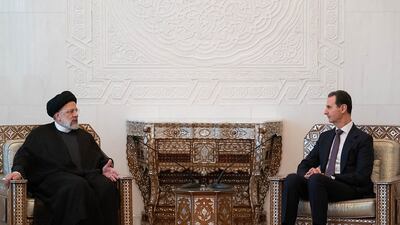President Ebrahim Raisi arrived in Damascus on Wednesday in the first visit by an Iranian leader to Syria since the civil war began.
He landed at Damascus International Airport shortly after 10am local time (11am UAE time), state media reported.
“Syrian-Iranian relations are rich in content, rich in experiences and rich in the vision that they formed and because they were also, during difficult periods, a stable and constant relationship despite the severe political and security storms that struck the Middle East,” President Bashar Al Assad said during a meeting with President Raisi after an official reception at the presidential palace.
The two discussed relations and regional developments, Syrian state news agency Sana reported. Mr Raisi praised Damascus for its “victory despite the threats and sanctions imposed against you”.
The presidents signed a long-term strategic co-operation agreement, including a memorandum of understanding on oil industry co-operation, the Syrian state news agency reported.
Syria's eastern oilfields have been in long term production decline and heavily damaged by conflict, but they are also currently under the control of US-backed Kurdish militias. Syria has been largely dependent on Iranian oil and fuel supplies, but shipments have dropped in recent months due to problems Syria has had paying Tehran.
The drop in deliveries has worsened an already severe fuel crisis in Syria.
His two-day visit, the first in 13 years by a high Iranian official, will focus on strengthening economic relations between the countries, government officials said.
The trip takes place at a time of increasing efforts among states to bring Damascus back into the international fold after more than a decade of isolation.
The Iranian delegation includes Foreign Minister Hossein Amirabdollahian, Defence Minister Mohammad Reza Ashtani, and Oil Minister Javad Oji.
The visit shows the victory of the political will of the resistance and the success of the government's diplomacy in completing the regional integration process,” said Mr Amirabdollahian.
Iran's military support helped the Syrian regime regain much of its territory during the civil war.
In addition to sending Iranian advisers led by Islamic Revolutionary Guard Corps' Quds Force general Qassem Suleimani — who was killed in a US drone strike near Baghdad in 2020 — the IRGC created a huge network of foreign militias in Syria.
They include proxy fighters from Iraq's Popular Mobilisation Forces, Lebanon's Hezbollah and Shiite recruits from Afghanistan, part of an alliance that pro-IRGC figures called “the resistance.”
Syria's pro-government Al Watan newspaper reported that deals on “energy and electricity” were among a large number of agreements and memorandums of understanding expected to be signed.
There will also be discussions on a new Iranian credit line for Syria for investment in the power sector, the daily said, in a country where power cuts can last for as long as 20 hours a day.
In January 2019, Syria and Iran signed 11 agreements, including one on “long-term strategic economic co-operation”.
Damascus-based analyst Osama Danura said the visit would “open a new page in the close relationship between the two countries”, noting that Iran had “put itself forward strongly as a contributor to the reconstruction phase”.
Mr Ashtani attended talks in Istanbul last week to discuss Syrian security and efforts to normalise relations between Turkey and Syria.
Saudi Arabia cut ties with Iran in 2016 after protesters stormed its diplomatic posts in Iran following the kingdom's execution of a prominent Shiite cleric.
Riyadh and Tehran announced a restoration of diplomatic ties after five rounds of Chinese-brokered talks, and are expected to reopen their respective embassies by June.
Mr Amirabdollahian visited Damascus in March and said Tehran was in favour of the Arab world's aid to Syria after February's deadly earthquake.
This week's trip will mainly focus on economic ties and the signing a series of related agreements, a senior Iranian Foreign Ministry official told IRNA.
“In such a situation, when the economic and political relations of the two countries, Iran and Syria, are at their best level, carrying out this trip and signing the prepared memorandums will strengthen the relations between the two countries,” said Abbas Golro, head of the parliament's foreign relations committee, who is accompanying Mr Raisi to Damascus.
The trip sends a wider “message to the region”, he said, adding that economic plans made before the civil war are now taking effect.
Co-operation and the improvement of relations with regional neighbours have been a priority of the Raisi administration, first Vice President Mohammed Mokhber said last month.


